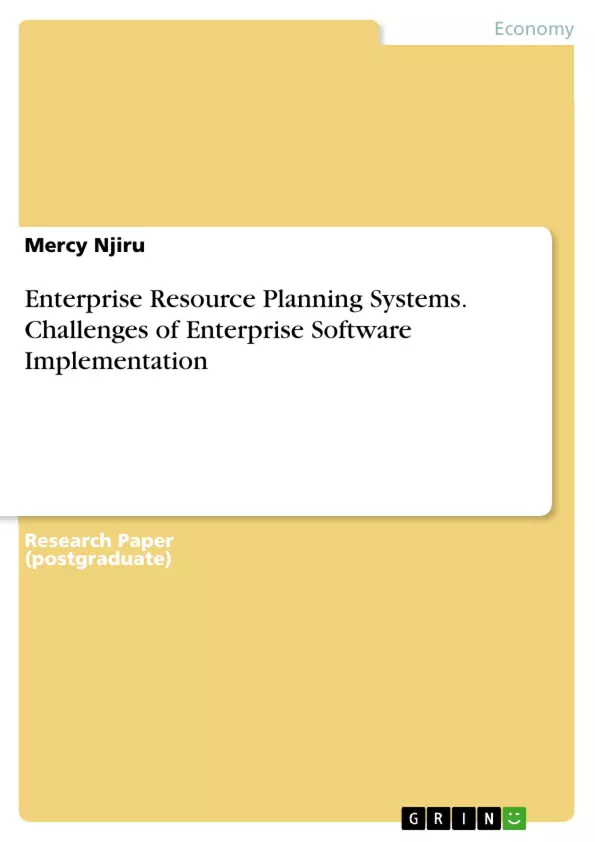However challenging it may be in carrying out this research, its findings are expected to give a contribution towards role-based ERP system implementation practice. This study’s findings are expected to be significant to various interested parties, for example vendors may understand price- and design-based problems facing target customers and simplify applications to assist companies to implement role-based ERP systems with ease. On the other hand, people or companies implementing role-based ERP systems can also realize the internal and extraneous needs and get prepared effectively.
The trouble in implementing role-based ERP systems in industrialized nations may be worsened by the assertion that role-based ERP embodies proved ways of doing business thus requiring companies adopting role-based ERP systems to adjust their corporate processes to comply with business practices constitutional in role-based ERP packages. Venders contend that the implementation of such best practices lowers the cost of configuring the software and results in improving the company’s processes. Therefore, Gosain, S. (2004) says that companies and their stakeholders many times strain to implement such practices.
Inhaltsverzeichnis (Table of Contents)
- Challenges of Enterprise Software Implementations
- Research Problem
- Theoretical Issues
- Research Questions
- Methodology
- Difficulties and Pitfalls
- Literature Review
- Benefits
Zielsetzung und Themenschwerpunkte (Objectives and Key Themes)
This research study investigates the challenges associated with implementing role-based Enterprise Resource Planning (ERP) systems, particularly focusing on the unique problems faced by companies in industrialized nations. The study aims to provide a comprehensive understanding of the inherent causes behind ERP implementation failures and offer insights into best practices for successful implementation.
- Exploring the causes of failure in role-based ERP implementation, particularly in industrialized nations.
- Analyzing the impact of cultural, economic, and infrastructural factors on ERP implementation success.
- Investigating the challenges associated with aligning corporate processes with role-based ERP systems and their best practices.
- Developing practical guidelines for businesses to effectively identify, prioritize, and address organizational pains related to ERP implementation.
- Examining the influence of contextual and cultural factors on ERP implementation success.
Zusammenfassung der Kapitel (Chapter Summaries)
- Challenges of Enterprise Software Implementations: This chapter provides an overview of the research problem, highlighting the high rate of ERP implementation failures and the lack of understanding regarding their underlying causes. The chapter emphasizes the unique challenges faced by companies in industrialized nations due to the inherent nature of role-based ERP systems.
- Research Problem: This chapter delves deeper into the research problem by examining the reasons behind ERP implementation failures. It explores the challenges associated with aligning corporate processes with role-based ERP systems and the inherent tension between the need for customization and the standardized nature of ERP packages.
- Theoretical Issues: This chapter presents the theoretical framework underpinning the study. It explores the concept of organizational pains and how they can be addressed through the implementation of role-based ERP systems. The chapter also highlights the importance of considering cultural factors and their influence on ERP implementation success.
- Research Questions: This chapter outlines the specific research questions that the study aims to answer. It focuses on understanding the common problems encountered in implementing role-based ERP systems and evaluating their effectiveness in delivering timely and accurate information for decision-making.
- Methodology: This chapter describes the research methodology employed in the study. It highlights the use of a multi-paradigm approach, combining case studies and questionnaires to gather comprehensive data. The chapter discusses the rationale behind this approach and its benefits for understanding the complexity of ERP implementation challenges.
- Difficulties and Pitfalls: This chapter explores the limitations of the research study. It acknowledges the challenges associated with obtaining comprehensive data on ERP implementation across various industries and geographical locations. The chapter discusses the potential limitations of the sampling frame and the difficulties in obtaining access to relevant data from large corporations.
- Literature Review: This chapter provides a review of existing literature on role-based ERP implementation challenges. It examines the findings of previous studies and highlights the key barriers identified, including technological complexity, high implementation costs, and resistance to organizational change.
- Benefits: This chapter discusses the potential benefits of the research study. It highlights the value of its findings for various stakeholders, including vendors, implementing organizations, and ERP system users. The chapter emphasizes the importance of understanding the challenges and opportunities associated with ERP implementation to ensure successful project outcomes.
Schlüsselwörter (Keywords)
The main keywords and focus topics of this research study are role-based ERP systems, ERP implementation, organizational change, cultural factors, implementation challenges, success factors, best practices, case studies, multi-paradigm approach, and organizational pains.
Frequently Asked Questions
What are the main challenges in implementing role-based ERP systems?
Challenges include technological complexity, high costs, resistance to organizational change, and the difficulty of aligning existing corporate processes with the standardized best practices of the ERP software.
Why do ERP implementations often fail in industrialized nations?
Failure is often linked to the rigid nature of role-based ERP systems, which require companies to adjust their established business practices to fit the software, leading to internal strain and stakeholder resistance.
What is the concept of "organizational pains" in this study?
Organizational pains refer to the specific inefficiencies and problems within a company that an ERP system is intended to solve, though the implementation itself can create new "pains" if not managed correctly.
How do cultural factors influence ERP implementation success?
Cultural factors affect how employees perceive change and how well the standardized business processes embedded in the ERP system align with local corporate or national culture.
What methodology was used in this research?
The study employed a multi-paradigm approach, combining case studies and questionnaires to gather comprehensive data from various industries.
How can ERP vendors assist companies in the implementation process?
Vendors can help by simplifying applications, understanding the price- and design-based problems of their customers, and providing better support for role-based configurations.
- Quote paper
- Mercy Njiru (Author), 2014, Enterprise Resource Planning Systems. Challenges of Enterprise Software Implementation, Munich, GRIN Verlag, https://www.grin.com/document/315034



